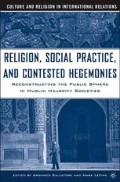Abstract
In the spring of 2001, Saudi Arabia’s Grand Mufti issued a fatwa condemning suicide attacks in the name of Islam. In the Egyptian press, the fatwa was perceived as a desecration of the icon of Palestinian resistance (the martyr or shahid). An “Arab public opinion,” voicing its concerns over the jeopardized interests of the community (umma), was soon staged in its daily columns. In this chapter, I explore a debate that laid bare the contemporary procedures by which consent is manufactured. For that purpose, I address the reception of the Saudi fatwa in the Egyptian press, the argumentation construed in favor or against it, and the explanations put forth to make sense of the acts it sanctioned.
Access this chapter
Tax calculation will be finalised at checkout
Purchases are for personal use only
Preview
Unable to display preview. Download preview PDF.
References
Anderson, Benedict. 1991 [1983]. Imagined Communities. Reflections on the Origins and Spread of Nationalism. London: Verso.
Borlandi, Massimo, and Mohamed Cherkaoui, eds. 2000. Le Suicide: un siècle après Durkheim. Paris: PUF.
Botiveau, Bernard. 1993. “Penser, dire et interdire: logiques et enjeux de la censure des écrits en Égypte.” Égypte/Monde Arabe no. 14.
Bourdieu, Pierre. 1971. “Genèse et structure du champ religieux,” Revue Française de Sociologie 12: 295–334.
Bucaille, Laetitia. 1998. Gaza: la violence de la paix. Paris: Presses de Sciences Po.
Bucaille, Laetitia. 2003. “L’ impossible stratégie palestinienne du martyre: victimisation et attentats suicide.” Critique internationale no. 20: 117–34.
CEDEJ. 2001. Dossier de Presse, section on Al-Qadiyya al -filistiniyya: Intihar/ istishhad [Press clippings from the Egyptian national press: al-Ahali, al-Ahram, al -Ahrar, al-Akhbar, al-‘Arabi, al-Jumhuriyya, al-Hayat, al-Midan, al-Musawwar, alQahira, al-Usbu‘, al-Wafd, Ruz al -Yusuf, Sawt al-Umma].
Daisha, Adeed, ed. 1983. Islam in Foreign Policy. Cambridge: Cambridge University Press.
Dupret, Baudouin, and Jean-Noël Ferrié. 2001. “The Inner Self and Public Order.” In Muslim Traditions and Modern Techniques of Power, vol. 3 of Yearbook of the Sociology ofIslam, ed. Armando Salvatore, Hamburg: Lit; New Brunswick, NJ: Transaction.
Durkheim, Emile. 1960 [1897]. Le Suicide, Paris: PUF.
Eickelman, Dale F. 1992. “Mass Higher Education and the Religious Imagination in Contemporary Arab Societies.” American Ethnologist 19, 4: 643–55.
Eickelman, Dale F., and James Piscatori. 1996. Muslim Politics. Princeton: Princeton University Press.
Eickelman, Dale F., and Armando Salvatore. 2004 [ 2002 ]. “Muslim Publics.” In Public Islam and the Common Good, ed. Armando Salvatore and Dale F. Eickelman, Leiden and Boston: Brill, 3–27.
Habermas, Jürgen. 1989 [1962]. The Structural Transformation of the Public Sphere, trans. Thomas Burger, Cambridge, MA: MIT Press.
Habermas, Jürgen. 1992. “Further Reflections on the Public Sphere.” In abermas and the Public Sphere, ed. Craig Calhoun. Cambridge, MA: MIT Press, 421–62.
Hallaq, Wael. 1997. A History of Islamic Legal Theories. Cambridge: Cambridge University Press.
Hamzah, Dyala. 2001. “La censure ou comment la contourner: dire et ne pas dire dans l’Egypte contemporaine.” Egypte/Monde Arabe no. 3.
Hamzah, Dyala, and Pénélope Larzillère. 2005. “De la lutte nationale à la fondation étatique et retour: les intellectuels palestiniens, d’Oslo I à Intifada II.” In Les nouveaux intellectuels en Islam, ed. Malika Zeghal and Farhad Khosrokovar, Paris: Balland.
Khosrokovar, Farhad. 1993. “Chiisme mortifère: les nouveaux combattants de la foi.” L’Homme et la Société no. 107–08: 93–108.
Masud, Muhammad Khalid, Brinkley Messick, and Ahmad Dallal. 1995. “Fatwa,” Oxford Encyclopedia of the Modern Islamic World, vol. 2, 8–16.
Masud, Muhammad Khalid, Brinkley Messick, and David S. Powers, eds. 1996. Muftis, Fatwas, and Islamic Legal Interpretation. Cambridge, MA and London: Harvard University Press.
MEMRI (www.memri.org): Inquiry and Analysis, no. 53 (May 2, 2001); no. 54 (May 3, no. 65 (July 26, 2001); no. 66 (July 27, 2001): “Debating the Religious, Political and Moral Legitimacy of Suicide Bombings,” Parts I to IV.
al-Quds al-‘arabi, London.
Regional Surveys of the World. 2001. The Middle-East and North -Africa 2002, 48th ed., London: Europa Publications.
Rosenthal, Franz. 1946. “On Suicide in Islam.” Journal of the American Oriental Society 66: 239–59.
Rosenthal, Franz. [1971] 1986. “Intihar,” Encyclopedia of Islam, vol. 3, 2nd ed.
Salvatore, Armando, 2001. “Mustafa Mahmud: a Paradigm of Public Islamic Entrepreneurship?” In Muslim Traditions and Modern Techniques of Power, vol. 3 of Yearbook of the Sociology of Islam, ed. Armando Salvatore, Hamburg: Lit; New Brunswick, NJ: Transaction.
Skovgaard-Petersen, Jakob. 1997. Defining Islam for the Egyptian State, Muftis and Fatwas of the Dar al-Ifta’. Leiden: Brill.
Tyan, Emile. 1960. Histoire de l’organisation judiciaire en pays d’Islam. Leiden: Brill.
Umlil, ‘Ali. 1996. al-Sulta al-thaqafiyya wa-l-sulta al-siyasiyya. Beirut: Markaz dirasat al-wahda al-‘arabiyya.
World Wide Web: www.amin.org, www.amin.org, www.islamonline.net, www.mfa.gov.il, www.hrw.org, www.jmcc.org.
Willis, John Ralph. 1996. “The fatwas of condemnation.” In Muftis, Fatwas, and Islamic Legal Interpretation, ed. Muhammad Khalid Masud, Brinkley Messick, and David S. Powers, Cambridge, MA and London: Harvard University Press, 153–61.
Editor information
Editors and Affiliations
Copyright information
© 2005 Armando Salvatore and Mark LeVine
About this chapter
Cite this chapter
Hamzah, D. (2005). Is There an Arab Public Sphere? The Palestinian Intifada, a Saudi Fatwa and the Egyptian Press. In: Salvatore, A., LeVine, M. (eds) Religion, Social Practice, and Contested Hegemonies. Culture and Religion in International Relations. Palgrave Macmillan, New York. https://doi.org/10.1057/9781403979247_8
Download citation
DOI: https://doi.org/10.1057/9781403979247_8
Publisher Name: Palgrave Macmillan, New York
Print ISBN: 978-1-349-53082-3
Online ISBN: 978-1-4039-7924-7
eBook Packages: Palgrave Political & Intern. Studies CollectionPolitical Science and International Studies (R0)

